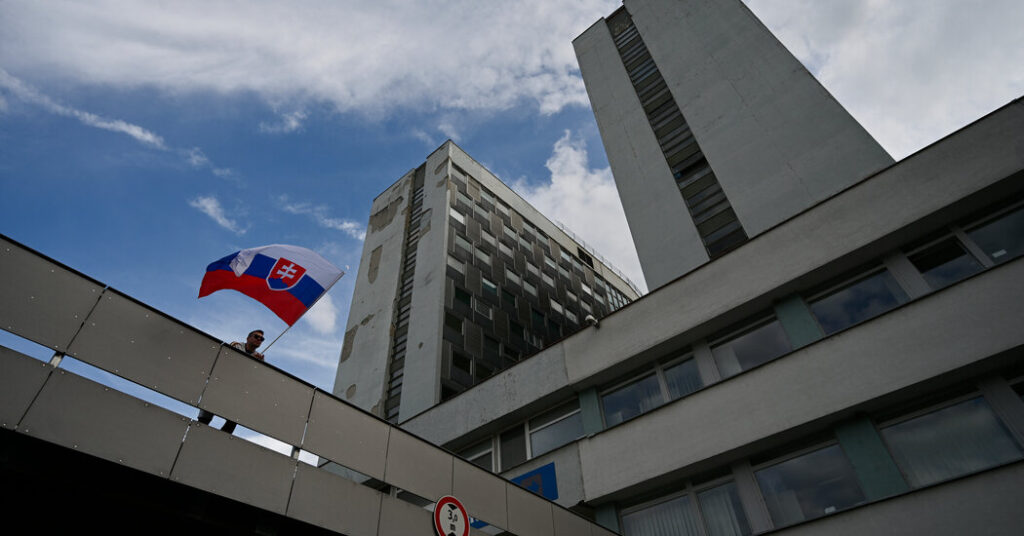Questions arose in Slovakia on Friday, as shock over the assassination of Prime Minister Robert Fico began to give way to concern about what comes next in the deeply polarized country.
While the prime minister is hospitalized, authorities have kept details about the attack, the attackers and even who the country’s leader is to a minimum. Officials said they will provide more information soon but the situation is sensitive.
They did not name the suspect – whom Slovakia’s interior minister described as a “lone wolf” who became radicalized after last month’s presidential election – or when he would appear in court to face charges of premeditated attempted murder. They called the shootings politically motivated and urged the public and politicians to tone down political rhetoric and hate while the investigation unfolds.
Local media reported on Friday that police escorted the suspect to his home in the central Slovak town of Levice, where they searched the house and seized documents. Police did not immediately respond to a request for comment.
Details of Mr. Fico’s injuries and condition are also closely guarded. Local news outlets reported that doctors will meet on Monday to decide whether the prime minister can be transferred from the intensive care unit of a hospital in central Slovakia to the capital, Bratislava, where he underwent surgery.
Deputy Prime Minister Robert Kalinak told a news conference on Thursday that Fico’s condition was stable but “not yet out of danger” and that he faced a “difficult” recovery.
“I must say that his health condition is very serious,” Slovakia’s president-elect Peter Pellegrini said after visiting Mr Fico in hospital in Banská Bystrica on Thursday afternoon.
There has been no formal announcement as to who will govern in Fico’s absence. Local news media quoted ministers as saying Mr Kalinak had been presiding over the meeting.
Authorities are conducting two investigations, one into the attackers and another into the response of security forces at the scene, and have urged against hasty judgment.
Slovak officials acknowledged that police actions had been criticized. Local news outlets published interviews with security experts and analyzed the gunman’s actions and police response, trying to understand how the attackers fired at close range at least five times before being subdued.
The investigation comes against the backdrop of deep political divisions in Slovakia. Fico has been pushing for a controversial judicial reform to limit the scope of corruption investigations, and he has also moved to reshape the national broadcasting system to remove the government’s alleged liberal bias.
Senior officials in Fico’s ruling Smer party actually accused liberal journalists and opposition politicians of inciting the assassination attempt through strong criticism of the government’s actions. Still, Pellegrini, an ally of Fico who was elected last month, has been one of the loudest voices calling for calm.
A lack of information from authorities has fueled speculation about the identity and motives of the attackers, prompting repeated warnings from the Interior Ministry against the dissemination of “unconfirmed” details.
The ministry said late Thursday that “a lot of misinformation” was circulating about the attack. On an existing website dedicated to combating scams, it labeled unverified news reports that the suspect was a member of a Slovak paramilitary group and that his wife was a Ukrainian refugee as “untrue” , but no verifiable information is provided.
While officials warned that tensions risked spreading, some in Slovakia expressed concern about whether Fico might die and what might happen after he recovers.
“Society is very polarized today, and after this attack it will become even more polarized,” 34-year-old translator Hana Klistincova said in an interview in Bratislava. more serious”. “I personally am not worried that the attack will be repeated – it was the impulsive act of one man – but I am worried about the impact it will have on society after our coalition leaders started blaming the opposition and the media, rightly so.”
Veronika Kladivikova, a 27-year-old seamstress from the central Slovak town of Banská Štiavnica, said she was shocked by the attack.
“Even families are divided. I feel that way in my own family.
But she said she was “not scared right now,” adding, “I hope people stay sensible and don’t panic, let alone fight and divide each other.”
Sarasinkulova Contributed reporting.

